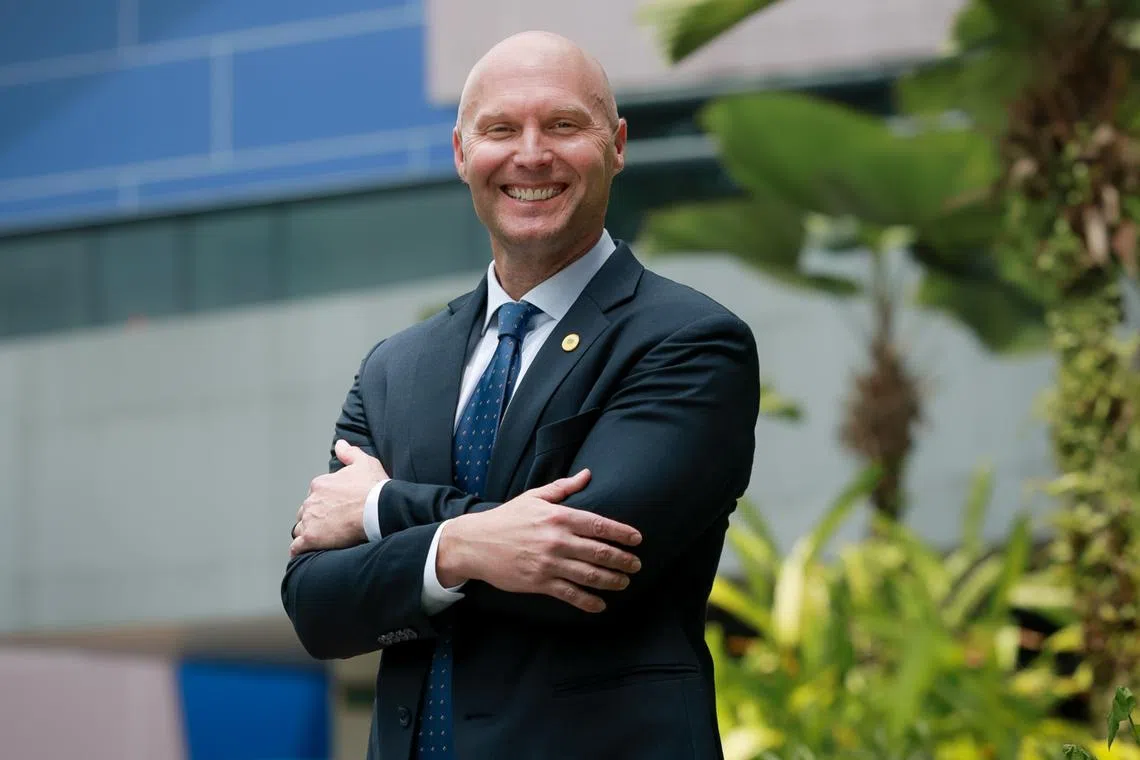Secret Service agent who protected President Trump now leads Interpol’s cybercrime unit in Singapore
Sign up now: Get ST's newsletters delivered to your inbox

Mr Neal Jetton was on US President Donald Trump’s detail in his first term, and also protected the First Family and other government officials.
ST PHOTO: GAVIN FOO
Follow topic:
SINGAPORE - Nearly two decades ago, an epiphany on a plane led American Neal Jetton to become a Secret Service agent instead of working as a molecular biologist.
On his way back from a job interview to be a professor, he wondered what he was doing with his life.
Speaking to The Straits Times, Mr Jetton said: “I remember flying back home and, on the plane, I was like, ‘They may offer me this job and I don’t want it’.”
He instead signed up to join the Secret Service.
He was on US President Donald Trump’s detail in his first term, and also protected the First Family and other government officials.
Now, as head of Interpol’s cybercrime directorate based in Singapore, Mr Jetton leads the global charge against phishing and malware.
From its headquarters in Napier Road, the directorate provides support for international operations targeting cybercrime, assisting local law enforcement in dismantling hostile networks behind various online criminal activities.
This included Operation Serengeti in 2024, when it partnered pan-African police body Afripol.
More than 35,000 victims were identified during the operation, which targeted criminals behind ransomware, business e-mail compromise and online scams, as well as digital extortion.
These cases were linked to nearly US$193 million (S$258 million) in financial losses worldwide.
It resulted in the arrests of 1,006 suspects from 19 African countries.
The directorate has also been working with other teams within Interpol to tackle the issue of scam centres,
In these compounds run by criminal organisations and located mainly in Laos, Cambodia and Myanmar, thousands have been lured to work as forced labour, stealing billions of dollars from victims worldwide.
Such centres are a “perfect storm” of multiple areas of crime that converge, Mr Jetton said, requiring various units within Interpol to work together to tackle them.
“If it’s a concern for our member countries, it’s a concern for us,” he said, adding that government officials in South-east Asia have expressed worries to him about the impact of scam centres.
He said the concern is not just over fraud and scams, with people wiring money under false pretences.
He added: “There’s the very real human trafficking element too. So it expands into (the fact that) people’s lives are in danger as well. It’s not just their finances.”
Mr Jetton said that as the world grows more interconnected, so do criminals, which means local law enforcement cannot work in silos.
He noted that Interpol often taps its network of industry partners, which includes firms like Trend Micro, Visa and Group-IB.
His team forwards incidents that might be flagged by private partners, and often provides guidance for local agencies which might lack the technical expertise to deal with certain types of crime.
While member countries have not reported many crimes linked to artificial intelligence for now, Mr Jetton said the technology helps with the initial step in phishing.
For instance, AI helps make e-mails and voice messaging sound legitimate, making the fight against cybercrime more challenging.
“With any sort of emerging tech, you’re going to have to define and develop the tools that you need to combat these crimes, and that takes money and resources,” he said.
The nature of Interpol is that with 196 member countries, some, like Singapore and the US, may be more well resourced than others, he added.
In this respect, Interpol also helps in capacity-building, training officers on technology and techniques to help battle various types of cybercrime.
Despite being head of the cybercrime directorate, Mr Jetton himself was the subject of a phishing e-mail.
Several months ago, a law enforcement colleague received an e-mail from what was purported to be the head of Interpol’s cybercrime directorate.
He said there were mistakes in the e-mail, but was coy in revealing them to ensure that criminals would not be able to learn from them and make future attempts more legitimate.
The matter was reported to the local authorities.
A 17-year veteran of the Secret Service, Mr Jetton cut his teeth on a cyber task force in Los Angeles, where he investigated credit card fraud, auction fraud and even child sexual exploitation crimes.
He later joined the President’s detail as a close protection officer.
He said: “I know people have their own political leanings, but I’ll say the people we protected were always respectful to me and my team.
“In the Secret Service, you get to see them when they let their guard down a little bit.”
After a senior colleague suggested the opening at Interpol, Mr Jetton applied for the secondment, fulfilling a long-held dream of working internationally.
He moved to Singapore in August 2024 with his wife and 14-year-old son, and lives by the Singapore River.
It was only in Singapore that his son got his first mobile phone. But he and his wife decide what apps he can download.
Mr Jetton said: “We don’t just hand our son the phone and say you’re off, and we never check it. My wife looks at it so we know what’s going on.”
Correction note: In an earlier version of the story, we said Mr Jetton was a former Secret Service agent. This is incorrect. He is still a Secret Service agent. We are sorry for the error.

